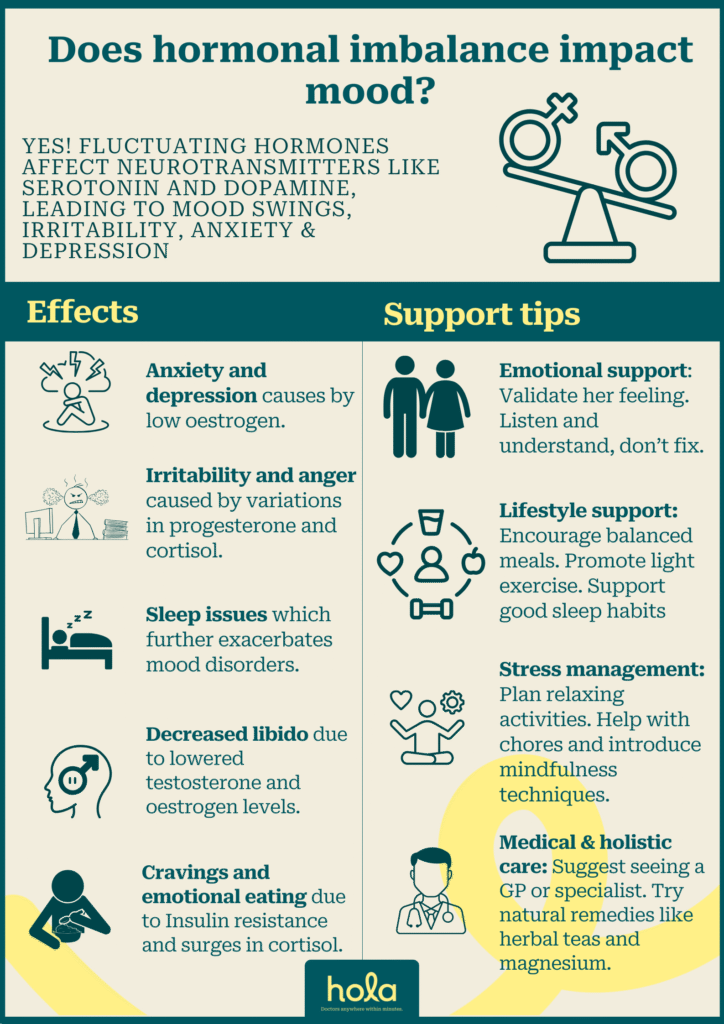Hormonal imbalance and mood swings: What you can do to calm her down
Written by editorial staff writer at Hola. Medically reviewed by Amira Shah, MA in Counselling Psychology, Registered Psychotherapist.

Contents

Summary: Hormonal imbalance can cause mood swings, like sadness or irritability. Encourage a healthy diet, regular exercise, good sleep, and stress relief to stabilise emotions. Patience, understanding, and support are essential in helping someone cope with hormonal mood fluctuations effectively.
Hormonal imbalance – it may seem like a plot from a science fiction novel, but for many people, it’s a very real and often frustrating part of life. When hormones are out of balance, they don’t just mess with physical health; they can also cause emotional turbulence. One minute, you might feel on top of the world, and the next, you could be overwhelmed by waves of irritability and sorrow. Mood swings are among the most common and noticeable signs of hormonal changes. Whether it’s the fluctuations of a menstrual cycle, menopause, pregnancy, or conditions like PCOS, understanding how hormones shape our mood is key to managing those emotional rollercoasters—and knowing how to calm the chaos can be incredibly helpful.
Does hormonal imbalance impact mood swings?
Yes, hormonal imbalance can lead to mood fluctuations by influencing neurotransmitters such as serotonin and dopamine. Changes in estrogen, progesterone, testosterone, cortisol, and thyroid hormones can result in feelings of irritability, anxiety, or depression. Common triggers include menstrual cycles, pregnancy, menopause, thyroid issues, chronic stress, and polycystic ovary syndrome (PCOS). If mood swings are intense, it’s advisable to consult a healthcare provider for hormone testing and appropriate treatment.
Psychotherapist Amira based in Canberra, ACT says that ‘Effective ways to manage these issues include stress reduction techniques, a well-balanced diet, regular physical activity, and consulting medical professionals to help regulate hormones and improve mood. ‘
What other effects hormone imbalance has that affect women’s behaviour
Hormonal imbalances can greatly affect women's behaviour, emotions, energy levels, and cognitive abilities. Key effects include:- Increased feelings of anxiety and depression: Low oestrogen can lead to decreased serotonin levels, contributing to mood disorders.
- Irritability and anger: Variations in progesterone and cortisol may amplify stress reactions.
- Fatigue and brain fog: Thyroid irregularities and low oestrogen can result in mental tiredness and trouble focusing.
- Sleep issues: Low progesterone and elevated cortisol can interfere with sleep, which can exacerbate mood problems.
- Decreased libido: Lowered testosterone and oestrogen levels can diminish interest in sexual activity.
- Cravings and emotional eating: Insulin resistance and surges in cortisol can provoke unhealthy eating patterns.
Also read: Premenstrual syndrome & hormonal mood swings: What to do
Ready for positive change? Start your mental health care plan here.
How to tell if mood changes are mental or hormonal
It can be challenging to determine if mood changes stem from mental health issues or hormonal factors, but certain distinctions can aid in understanding:- Hormonal-related mood swings: These are usually linked to a cycle, such as the menstrual cycle, pregnancy, menopause, or thyroid problems. Symptoms might include irritability, anxiety, fatigue, and mental fog.
- Mental health-related mood swings: These are often more constant, not tied to hormonal cycles, and can involve deeper emotional distress, enduring sadness, or extreme worry.
Also read: Signs of hormone imbalance: How to tell & next steps
How to deal with hormonal imbalance when your woman is experiencing it
To support your partner in dealing with hormonal imbalances, you should show emotional understanding, make lifestyle changes, and practice patience. Here are ways to assist:
Emotional support:
- Be patient and understanding. Acknowledge her feelings by expressing that you comprehend what she is experiencing and are available for her.
- Foster open communication by inquiring about her feelings and listening attentively without immediately aiming to "fix" the situation.
Lifestyle support:
- Encourage a well-balanced diet by aiding her in consuming hormone-friendly foods, including leafy greens, healthy fats, and lean proteins.
- Motivate regular physical activity through exercises like yoga, walking, or strength training to help balance hormone levels.
- Emphasise the importance of sleep by ensuring she has enough rest and follows a calming nighttime routine.
Stress management:
- Help her unwind by organising relaxing activities such as a spa day, meditation, or a quiet evening at home.
- You may also take on household chores to lighten her load, particularly during challenging times.
- Promote practices like deep breathing or mindfulness to manage stress hormones like cortisol.
Medical and holistic support:
- Encourage medical consultation if symptoms persist, suggesting she see a doctor or endocrinologist.
- Support using natural remedies like herbal teas, magnesium supplements, and essential oils that may contribute to hormonal balance.
- Be patient with treatment processes, as achieving hormonal equilibrium takes time, whether through medications, therapy, or lifestyle modifications.

Seek support from a mental health care plan
If hormonal imbalances significantly disrupt mood and daily functioning, pursuing assistance through a mental health care plan can be beneficial. A healthcare provider can evaluate symptoms, deliver counselling, and suggest therapy or medication as necessary. Cognitive behavioural therapy (CBT) and mindfulness strategies can provide relief from anxiety, depression, and mood fluctuations. Support groups or discussions with a psychologist can offer coping techniques. Encouraging your partner to seek professional assistance demonstrates concern and dedication to their well-being. A blend of medical treatments, lifestyle adjustments, and emotional backing can simplify the process of managing hormonal imbalances.
When hormones go haywire, mood swings can feel like a wild ride, but with the right strategies, it’s totally possible to calm things down. A balanced diet, regular physical activity, adequate rest, and stress-busting techniques can work wonders in keeping those emotional ups and downs in check. So, be patient, offer support, and remember that she will feel like herself again with a little care and balance.
Take control of your mental health. Begin your care plan now.
What we treat
- Cough
- Nausea & vomiting
- Fever
- Hayfever
- Fatigue
- Sore throat
- Acne
- Hair loss
- Gout
- Eczema
- Rosacea
- Sunburn
- UTI
- Erectile dysfunction
- Contraception
- Morning sickness
- Morning after pill
- Prostate health
- Anxiety
- Depression
- Stress
- Grief & loss
- Antidepressants
- Premature ejaculation
- Asthma
- Blood pressure
- Blood thinners
- Diabetes
- Cholesterol
- Migraines & headaches
- Allergies
- Body ache
- Heartburn & reflux
- Sleep disorder
- Pain relief
- Gastro
Related Articles
Disclaimer
This blog is for general informational purposes only and does not indicate that Hola Health provides all treatments or preventive measures mentioned. It is not intended to be a substitute for professional medical advice. Always seek the guidance of your doctor or other qualified health professional with any questions you may have regarding your health or a medical condition. For emergencies please immediately contact 000. Any medical topics discussed are intended to educate, not to imply availability through Hola Health.

Get affordable healthcare on your terms, with quick access to qualified, Australian-registered telehealth doctors & health practitioners, 24/7, 365 days a year. No more searching for ‘doctors near me‘ – Hola connects you instantly.
Address: 79 St Georges Terrace, Perth WA 6000


Hola Health App
Get affordable healthcare on your terms, with quick access to qualified, Australian-registered telehealth doctors & health practitioners, 24/7, 365 days a year. No more searching for ‘doctors near me‘ – Hola connects you instantly.
Call 000 for emergency or urgent medical help.
Address: 79 St Georges Terrace, Perth WA 6000
© Hola Health, a brand of Packapill Pvt Ltd


 Facebook
Facebook  X
X  Copy Link
Copy Link












